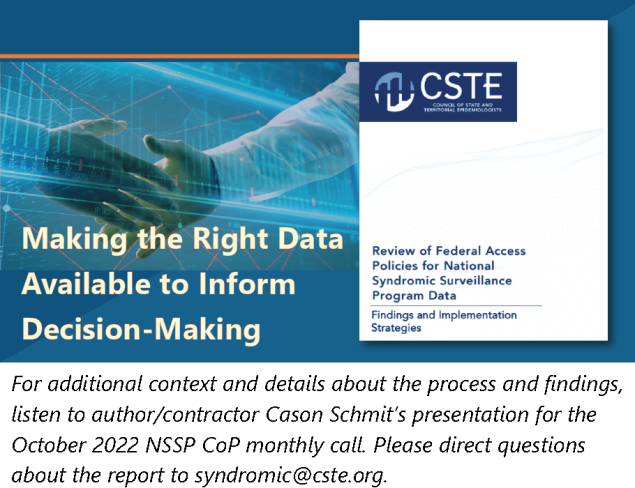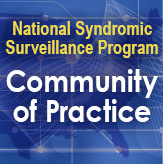Community of Practice Updates
Updated September 11, 2023
- Request to Join NSSP CoP Slack®* Workspace**Share info with peers, plan projects, and accelerate data analysis.
- NSSP CoP WebsiteCheck calendar, join community groups, and link to state and other resources.
- CoP MembershipJoin or update member info. Membership is independent of CSTE, voluntary, and free!
- Knowledge RepositoryFind resources on syndromes, data analytics, data sharing, and related topics.
- CoP Call RecordingsIncludes monthly CoP meetings (slides, recordings) and subcommittee calls.
- Success StoriesSubmit success story or request help from CSTE team.
*Slack is a registered trademark and service mark of Slack Technologies, Inc. **If you have questions about the NSSP CoP, its highly collaborative user groups, the NSSP CoP Slack Workspace (a collaboration platform), or syndromic surveillance, please email syndromic@cste.org.
Policy for Federal Access to NSSP Data

During the November 2022 CoP Monthly meeting, Acting NSSP Lead Karl Soetebier informed the community of efforts to make NSSP data more accessible and to improve collaboration toward common goals.
In early December 2022, Soetebier updated site administrators of NSSP’s ongoing work related to data use. He explained how expanded access to NSSP data during the COVID-19 public health emergency enabled innovation in areas such as trend indicators and classification, anomaly detection, and text mining by age and geography. The ability to work this way routinely, outside the context of a public health emergency, is not permitted by the current data use agreement.
In early 2023, to build on public health response innovations and to continue to enhance data use, CDC began designing a new NSSP agreement to incorporate lessons learned from the COVID-19 response, enable close collaboration between sites and CDC, enable new innovations and services for sites, and maximize responsible use of data and provide timelier synthesis of findings and recommendations. Further, this agreement would help respond to the top concerns raised by public health departments in the Review of Federal Access to National Syndromic Surveillance Program Data: Findings and Implementation Strategies, posted by the Council of State and Territorial Epidemiologists (CSTE) in February 2023.
CDC has made a thoughtful choice to change from a data use agreement (DUA) to a memorandum of understanding (MOU) to better reflect the collaborative nature of the agreement. By refocusing the DUA as an MOU, the collaborative and participatory goals of the partnership across federal, state, and local public health authorities become more transparent. Details of the DUA/MOU are being worked through.
Save the Date! 4th Annual Syndromic Surveillance Symposium
The Council of State and Territorial Epidemiologists (CSTE), in collaboration with CDC, is excited to announce that the 4th Annual Syndromic Surveillance Symposium will be held virtually December 5–7, 2023. Please save the date—and keep in mind there’s no registration fee for this conference. More details will be shared later this fall.
The Call for Abstracts is now open and will close on September 15, 2023, at 11:59 PM ET. Syndromic surveillance practitioners, epidemiologists, informaticists, and public health colleagues are invited to share their work, best practices, and lessons learned. We encourage you to submit an abstract.
NSSP CoP Monthly Meeting
The National Syndromic Surveillance Program (NSSP) Community of Practice (CoP) met on July 26, 2023. On average, 100 to 120 people participate in these monthly meetings. Recordings for CoP monthly calls are posted in the Knowledge Repository.
Jurisdiction Overviews—We Want to Hear from You!
In July, the NSSP CoP began featuring presentations by public health jurisdictions on the monthly CoP calls. Thanks, Kansas, for kicking off this project and for the great work you’re doing!
Each month on the CoP call, representatives from three to four public health jurisdictions will give a brief presentation about their programs, projects they’ve worked on, interaction with partners, challenges, and goals. We encourage state, local, territorial, and tribal jurisdictions to participate. Please sign up to present on an upcoming call.
NSSP Updates
NSSP Acting Lead Karl Soetebier commented on NSSP’s broad presence and the attention our work is gaining nationwide. Here’s an update on recent NSSP activities:
- An update to the Access & Management Center (AMC) is scheduled for September 2023. AMC improvements will include new data sources, features for pagination, and refinements and filtering for the Data Quality Dashboard. See details in Technical Updates.
- This fall NSSP plans to launch a new application called NSSP PRESS, or NSSP Publication & Reporting Enterprise for Syndromic Surveillance (PRESS). NSSP PRESS will help site personnel share information via the BioSense Platform and feature a repository of report templates that any site can populate with data. Unlike shared drives, code repositories, and other file hosting services, NSSP PRESS will provide an association-focused, metadata-rich toolbox for contextualizing and connecting reports with authors and audiences. More info to come!
- Call for User Acceptance Testing (UAT)—NSSP needs volunteers to conduct UAT new products. UAT will only require a few hours of your time and will give you a preview of items being released and help us make sure we deliver the best products possible. If interested, email nssp@cdc.gov and mention UAT.
- CDC NSSP is receiving questions about wildfires and heat-related illness from many national news organizations. We are sharing national-level and HHS Region-level data in our responses.
- NSSP is receiving questions from CDC’s malaria response, especially about testing data from Laboratory A. We are grateful to the Florida team for posting their working syndrome definition to Slack®.
- Reminder about Laboratory A data—Lab A data are available in ESSENCE and include both positive and negative results. Please contact us at nssp@cdc.gov if you have questions.
- COVID-19 Update—Although the U.S. Department of Health and Human Services announced on May 11, 2023, that COVID-19 is no longer a public health emergency, COVID-19 remains a public health priority that CDC monitors along with influenza and Respiratory Syncytial Virus (RSV). No one knows better than our Community of Practice that emergency department data are one of the best sources of timely data across health conditions. CDC launched a workgroup of people who work with these pathogens. The workgroup comprises members of NSSP, the National Center for Immunization and Respiratory Diseases (NCIRD), and the NSSP CoP. The workgroup is tasked with identifying the best ways to present these data to the public and imagining new ways to present meaningful ED data across pathogens. This activity aligns with our CDC Director’s priority to ensure public health data for respiratory conditions are shared with the public. This is a good opportunity for NSSP to be recognized for the work we’re doing. NSSP’s ongoing work to monitor COVID-19 is described on our website.
Best Practices Compendium
Anna Frick (AK) led a discussion on creating a Best Practices Compendium. The goal is to document processes for conducting syndromic surveillance in a public health department. She polled call attendees to identify their preferred format for the compendium and methods for collating and collating information. This discussion was the first of many to come. To join the discussion about this project, go to the #nssp-cop Slack channel or email syndromic@cste.org. Anna’s presentation is posted and available with other monthly calls on the Knowledge Repository.
NSSP Health Equity Toolkit
Rebecca Ruvane and Sarah Scott (ICF Contractors) provided an overview of the new Health Equity Toolkit that is being developed by NSSP. The goal of the toolkit is to provide a framework to bring a health equity lens to syndromic surveillance.
They updated the community on changes made to the draft since the October 2022 discussion. Rebecca and Sarah finished their presentation by leading a discussion with the community to gather additional feedback to incorporate into the final toolkit. Listen to the July recording to hear the discussion and learn more about the toolkit.
Published to the Knowledge Repository
- Recreational Boating Incidents v1 (syndrome definition): This syndrome definition identifies visits that likely reflect recreational boating incidents that should have been reported via federal regulation (33 CFR 174.121) to the United States Coast Guard as part of the National Recreational Boating Safety Program. This includes recreational boating incidents or injuries that occurred on a boat but not in transporting the boat or on a commercial boat (i.e., ferry boat or cruise ship). Recreational watercraft activities that occur on boats were included: wakeboarding, waterskiing, tubing. Other recreational watercraft were included: jet skis (including brand names like Sea-Doo and WaveRunner), kayaks, canoes, and rafts.The NSSP team and subject experts from the U.S. Coast Guard (USCG) worked with six public health jurisdictions (FL, ND, MI, TN, WA, and WI) to pilot the v1 definition.
- CDC Broad Acute Respiratory DD v1, republished August 2023 to acknowledge authors.
- Mental and Behavioral Health Resources: This list was compiled as a supplement for an MMWR publication on seasonal trends in behavioral emergency department visits among school aged children. Includes resources from CDC; Substance Abuse and Mental Health Services Administration (SAMHSA); Dept. of Education; Pima County, Arizona; Colorado; D.C. Office of the State Superintendent of Education; Kansas; Kentucky; New Mexico; North Carolina; and Tennessee.
Reminders and Announcements
- Expanded Look at Public Health Jurisdictional Work to be Added to NSSP CoP Meetings: The NSSP CoP is excited to announce an opportunity to highlight the great work being done by members. Beginning with the July NSSP CoP monthly call, representatives from three to four public health jurisdictions will give a brief presentation about their program, projects, partner interaction, challenges, and goals. We encourage local, territorial, and tribal jurisdictions of all sizes and in all stages of program development to participate. To sign up to present on an upcoming call, please complete this form.
- NSSP CoP New Member Orientation: These orientations will provide an overview of the NSSP CoP and its mission, vision, and organization; resources available to members; and a time for questions and answers. CSTE will send a calendar invitation to all NSSP CoP members closer to the meeting date.
- Join the Community and a subcommittee: Our Community is a great way to meet others working in syndromic surveillance and advance the work of syndromic surveillance at all jurisdictional levels. Become part of the Community or update your NSSP CoP membership to join a subcommittee here. Encourage others to join, too!
- Join and participate in the Slack workspace. This space is full of rich discussion among colleagues. This is an opportunity to collaborate with your peers outside CoP meetings.
- Submit success stories to be featured in NSSP Update and on the NSSP CoP website. You do valuable work every day that we want to highlight.
- Submit a topic for future NSSP CoP monthly calls. These calls are meant for the community, and we want to know what is most important to you.

It’s easy to join. And the community is always exchanging ideas, exploring possibilities, and discussing topics relevant to today’s surveillance challenges.
So what are your colleagues discussing?
- #analytic-tools
- #chief-complaint-processing
- #covid19
- #data-quality
- #data-sharing
- #drug-overdose-use
- #environmental-health-and-severe-weather
- #essence-user
- #general
- #hospital-admission
- #lab-data
- #mortality-data
- #national-data-requests-sop
- #new-member-orientation
- #nssp-cop
- #planned-analyses-and-publications
- #race-and-ethnicity
- #random
- #r-user
- #sas-user
- #spherr
- #syndrome-definitions
- #technical
- #training
- #violence-surveillance
Find and Join Channels
- Hover cursor over “Channels” on left side of Slack space.
- Click the three dots icon that appears next to “Channels” titled “Section Options.”
- Select “Browse Channels.”
- Find and join any channel that looks interesting!
